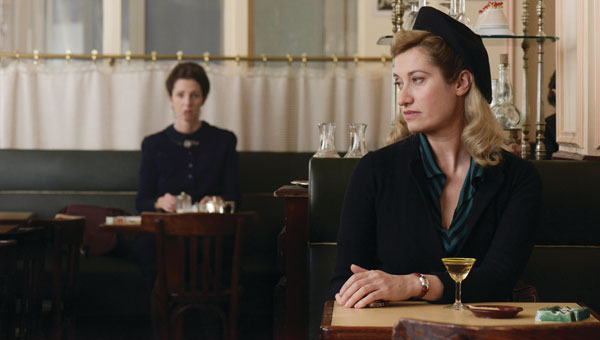Violette Review

After the recent summer spectacle of Sylvester Stallone and friends engaged in full-blown mayhem and global destruction, I thought I’d cleanse my palate with an altogether different kind of film.
And what could be more different than a biopic of a feminist French novelist from the mid twentieth century?
I am, after all, a sucker for French films and a sucker for novelist bios, so this seemed to tick all boxes.
Violette tells the story of one Violette Leduc, who I’d never heard of, and her relationship with Simone de Beauvoir, who I had, as well as Leduc’s literary career in general.
Leduc was born in the north of France in 1907, though the film picks up with her later in life: she is living in the countryside with husband-for-show Maurice Sachs, whilst World War Two rages around them. Sachs, a struggling writer, convinces his wife to pick up a pen and vent her frustration with, well, everything.
Leduc subsequently moves to Paris where she encounters de Beauvoir, who is already enjoying fame from her early work. Upon receipt of Leduc’s first draft of L’Asphyxie, de Beauvoir sees promise in the writer and helps publish her first novel.
We follow Leduc through both her professional and personal life, including both the men and the women in whose arms she seeks solace, right up to her death in Faucon in 1972.
Leduc’s work included the controversial Ravages and La Bâtarde, the latter being her most famous novel and incidentally proving a fitting subtitle for the film itself, encapsulating a person who never really felt wanted and never felt like she belonged.
Emmanuelle Devos is frankly superb in the title role, depicting a feisty yet fragile soul; strong yet occasionally needy and tortured yet driven.
And it’s a testament to Devos’ portrayal that we can empathise with Leduc, despite her evidently being difficult to get along with.
There is also strong support from the likes of Sandrine Kiberlain as de Beauvoir, Olivier Gourmet as Jacques Guérin and, as Violette’s mother, Catherine Hiegel (nope, not the girl from 27 Dresses).
Martin Provost, who both directed and co-wrote Violette, keeps the pace swift and focused. And at no point during its two hour plus running time, does the film seem to meander.
The use of long takes has a theatrical and immersive quality and the chapter structure of the film feels apt given the subject matter, providing sensible and brief pauses.
And it is pleasing that the film remains firmly focused on Leduc, rather than being distracted by the arguably more famous likes of de Beauvoir, Albert Camus or Jean Paul Sartre, the latter two of which are frequently mentioned by name, but wisely not featured onscreen.
Some points are admittedly glossed over, such as Leduc’s relationship with family members other than her mother, and her health problems, both mental and physical, which are heavily alluded to but never really explored in detail.
But such editing is inevitably necessary in any biopic to keep the story within any sort of conventional film parameters.
Violette’s a well-made film offering a considered and portrait of its gifted, yet human, subject.
Conor Brennan